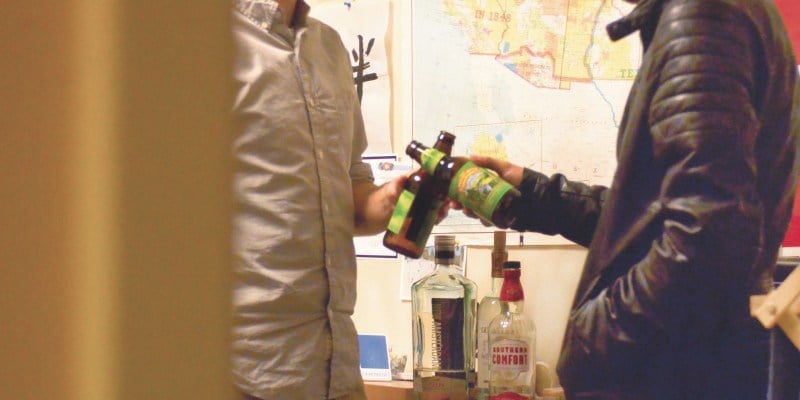“Your safety and alcohol misuse,” reads the subject of an Oct. 1 email sent out by Student Affairs. The opening line gets down to business. “We are writing this evening with concern about over-intoxication during the first two weekends of fall quarter.” A slew of sobering announcements follows. 10 undergraduates were transported to the hospital for alcohol poisoning in September. More upperclassmen drank themselves into semi-consciousness than any time in the past five years. Studies show that “excessive binge drinking” (as opposed — perhaps — to moderate binge drinking) can have “deleterious effects” on developing brains.
The situation is bleak. Alcohol poisoning isn’t all fun and games. (For something that is all fun and games, see the attached Cardinal Nights poster.) How might one convey the risks of unrestrained alcohol consumption to new college students? The administrators employ various tactics. We imagine ourselves and our friends in comatose states. We cast a dirty stare at the bottle of hard alcohol tucked away in our closets. We remember that our post-college lives will be much easier without alcohol-induced brain damage.
Suddenly, the email pivots to realpolitik. A familiar graphic offers us guidelines for pouring standard drinks of beer, wine or liquor. Hyperlinks direct us to various authority figures with whom we can discuss substance use. The numbers “9-1-1” appear in bold font. Students who need help should seek it early and often. Our safety and well-being matter. A gentle aside follows. Everyone is excited to be at college. Everyone wants to have a good time after a long week of classes. “We know that you are looking for fun things to do” (my eyes wander across the screen to the Cardinal Nights poster advertizing lawn games). Can we all please just try our best not to drink ourselves to the hospital this weekend?
This all is to say: There’s nothing new under the sun. Each fall, in college towns all over the world, adults watch with terror and dismay as students engage in orgiastic intoxication rituals. The scenes you see any Friday night on the Row occur with minimal variation on campuses throughout America. Must we continue to deceive ourselves? Handwringing and pleading won’t stop the festivities. Lawn games and Sno-cones won’t lessen the appeal of a mug full of Costco vodka. Peer-reviewed studies and vomit-filled nights won’t sour college kids on binge drinking. Why the need for theatrics? In any event, the administration can rest assured. Stanford students are just doing what students all over the world have been doing for decades.
Optimists might even consider a period of youthful binge drinking as a rite of passage. The arguments go something like this:
“Indulgence is a heuristic for cultivating moderation.”
“Today’s reckless 20-somethings are tomorrow’s responsible adults.”
“Kids should get all the debauchery out of their systems now.”
“The stakes are low. Who didn’t binge drink a handful of times in their youth?”
“What about Hemingway and Oscar Wilde and Andre the Giant and all the other famous historical drunks?”
Sure, the risks of brain damage are non-negligible. But everyone seems to turn out sort of fine in the end. Anyway, if we are so concerned with brain damage, shouldn’t we also devote our energy toward dissuading would-be football players?
To readers horrified by the above — I am merely paraphrasing the reasoning of hypothetical optimists. Of course, alcohol is dangerous and shouldn’t be abused. Of course, football brings communities together and spreads joy (or so I am told). Many people believe that Stanford and peer institutions are incubators of the future global elite. Isn’t there something a bit troubling about the spectacle of budding world leaders getting hammered every Friday night? Shouldn’t we worry that a major, if unofficial, component of the “world-class” education offered here involves hedonistic, deliberate self-poisoning? Are Stanford students bound to certain standards of behavior because of the privilege their education affords them?
It seems reasonable to answer “yes” to all three questions. But lots of things seem reasonable in the abstract, like organizing housing around non-contiguous “neighborhoods” or asking teenagers to put away their shot glasses and play Cornhole. In fact, moderation can’t be taught. You have to choose temperance over indulgence. You have to want to say no to the mug full of Kirkland Signature vodka. Administrators should save their reprimands. They won’t change any minds. The party will go on.
After all, as the old maxim goes, “Ain’t no party like a West Coast party, ‘cause a West Coast party don’t stop.”
